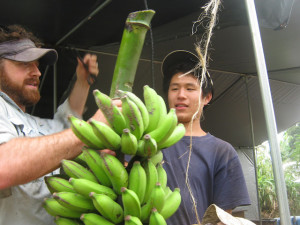Pacific Quest’s own Land Supervisor,
Travis Slagle, was recently featured in the National Public Radio’s food blog The Salt. The story titled
Can Gardening Help Troubled Minds Heal focused on the growing evidence that horticultural therapy can be an effective tool in the treatment of individuals with mental health conditions. Troubled minds maybe a broad term, but stormy, unmanageable thinking can range from depression and anxiety to post traumatic stress disorder and depression.
Commonly known as “horticulture therapy,” this field of experiential treatment has been utilized by psychologists in the U.S. from as early as the late 1700s. While scientists continue to conduct research on the efficacy of horticultural therapy, many mental health professionals concur with recent studies suggesting that the simple act of gardening decreases one of the most major stress hormones: cortisol.
If you didn’t know, cortisol is released in the body as a response to stress, and too much stress leads to cortisol levels that can cause damaging physiological and behavioral patterns often described as anxiety and depression. In a recent study published by the Journal of Health Psychology, researchers measured cortisol levels of subjects having been exposed to stress and then left to choose either to garden or read.  Interestingly, the participants in the study that chose to garden for 30 minutes exhibited a significantly lower level of cortisol than those who chose to read. The findings provide statistical evidence that supports gardening as a valid treatment for stress reduction and a natural way to lower cortisol levels in the body.
Interestingly, the participants in the study that chose to garden for 30 minutes exhibited a significantly lower level of cortisol than those who chose to read. The findings provide statistical evidence that supports gardening as a valid treatment for stress reduction and a natural way to lower cortisol levels in the body.
As an alternative to traditional wilderness therapy programs, Pacific Quest offers adolescents and young adults the opportunity to actively take control of their emotions and response to stress. Rather than hiking in the desert or sleeping on the snow, Pacific Quest students experience first hand the benefits of caring for a garden as a way to settle anxious nerves, and practice life skills that lead to a greater sense of self-worth.
PQ Makes National News!
Pacific Quest’s own Land Supervisor, Travis Slagle, was recently featured in the National Public Radio’s food blog The Salt. The story titled Can Gardening Help Troubled Minds Heal focused on the growing evidence that horticultural therapy can be an effective tool in the treatment of individuals with mental health conditions. Troubled minds maybe a broad …
Commonly known as “horticulture therapy,” this field of experiential treatment has been utilized by psychologists in the U.S. from as early as the late 1700s. While scientists continue to conduct research on the efficacy of horticultural therapy, many mental health professionals concur with recent studies suggesting that the simple act of gardening decreases one of the most major stress hormones: cortisol.
If you didn’t know, cortisol is released in the body as a response to stress, and too much stress leads to cortisol levels that can cause damaging physiological and behavioral patterns often described as anxiety and depression. In a recent study published by the Journal of Health Psychology, researchers measured cortisol levels of subjects having been exposed to stress and then left to choose either to garden or read. Interestingly, the participants in the study that chose to garden for 30 minutes exhibited a significantly lower level of cortisol than those who chose to read. The findings provide statistical evidence that supports gardening as a valid treatment for stress reduction and a natural way to lower cortisol levels in the body.
Interestingly, the participants in the study that chose to garden for 30 minutes exhibited a significantly lower level of cortisol than those who chose to read. The findings provide statistical evidence that supports gardening as a valid treatment for stress reduction and a natural way to lower cortisol levels in the body.
As an alternative to traditional wilderness therapy programs, Pacific Quest offers adolescents and young adults the opportunity to actively take control of their emotions and response to stress. Rather than hiking in the desert or sleeping on the snow, Pacific Quest students experience first hand the benefits of caring for a garden as a way to settle anxious nerves, and practice life skills that lead to a greater sense of self-worth.
Questions? Call or Text our Admissions Team: 808-937-5806